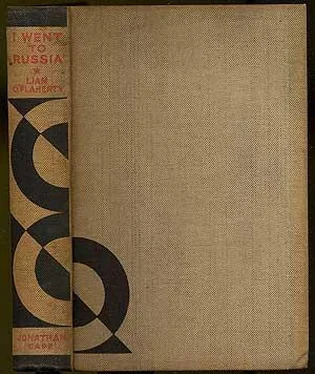‘You are a reactionary,’ he cried. ‘You are a bloody fool.’
‘More than likely,’I said, walking away from him.
A little later he approached me once more, wishing to continue the discussion, but I insisted on believing that he was a Social Democrat. So he finally sighed and agreed with me.
‘However,’ he said, ‘if you come to the entertainment given this evening by our local party to the Russian comrades you will see that we are really Communists in Norway.’
After I had finished lunch, the chief officer approached me and said:
‘Foreign engineers having lunch on ship. They say, please bring Irish writer to take coffee and liqueur with us.’
‘With pleasure,’ I said.
He was already drunk and looked rather unpleasant. I went with him to the dining room. There was a large company of foreigners there. They had finished lunch and were nearly all rather the worse for drink. They were engineers, customs officials and managers of factories, with their wives and sisters. At first they regarded me with suspicion. It is the customary attitude of middle class people towards strangers. They are never sure of themselves and therefore they are afraid of strangers. They are afraid of mixing with people beneath themselves in social standing. They are shy of mixing with people who are their social superiors. They are afraid that the former may borrow money from them or put them to shame. The latter might also put them to shame by superior manners and education.
I found it odd that their gluttony and drunkenness aroused in me feelings that were almost puritanical. Intelligent people alone can afford excess of the appetites. Stupid people become bestial when beyond the control of the strict rules of conduct that give them a veneer of culture. I could not help comparing their coarse delight in the pleasures of the table with the simple abstemiousness of the Russians. They ate and drank immoderately. Their conversation was idiotic. Their manners were barbarous. I had the unpleasant feeling that they were typical of our bourgeoisie, typically European, even though some of them were American. They made me sad. In their company I felt myself becoming a fanatical Bolshevik. I remembered, as I sat with them, how gross all our bourgeois life is, that wretched middle class life which is without grace or vitality or exuberance, where everybody says the same stupid things, plays the same stupid games, wears the same stupid clothes, makes love according to the same stupid formulas, has the same stupid ideas and reads the same stupid books.
Why is it so? It is not money or position that makes them stupid and gross and objectionable. The ‘oppressed masses’ are equally coarse, gross and stupid. They have the same ideals. They are really of the same class. They move in a mass, act in a mass, think in a mass. It seems that this is so because our civilisation has reached its climax. It is degenerating. Its force is spent. There are no fresh hordes within it to be trained, no fresh human resources to be exploited.
The Russian mate was the most gross and objectionable person there. He had detached himself from the Bolshevik herd and was trying to curry favour with the foreign herd by being more drunken and more gluttonous. Yet he had a vitality that the others lacked. His barbaric laughter and the brutal candour with which he admired the women compelled attention. He still possessed some of the earth’s electric force. The others had none.
They went into the lounge to dance. I danced with the sister of a Swedish engineer. She was pretty, quite sober and gently refined in manner. But she was lifeless. There was no energy in her body. She was irrevocably virginal. If she were the mother of ten children she would still remain a virgin. Life born in her womb would be half dead at birth and go through life supine, without vitality. She was obviously incapable of love and fiercely desirous of it, instinctively knowing that she was incapable of it. How different she was from Dunya and from the stewardesses and from the third mate Tatyana! In their eyes I could see the brooding consciousness that their bodies were the vehicles of procreation, the nesting places of human life, the generators of beautiful beings. They were aware of their electric energy and shrank from male contact, as from a flame that would surely ignite their passions. But the Swedish girl clung to me, lax, as a perished cat drapes its body about a fire, shuddering.
I shuddered at the thought that perhaps all European women were becoming like this Swedish girl, at least all the educated European women, the best types. Woe to Europe! When the women of a community fail to inspire lust in their men the community is doomed. When wine, gluttony and perverse practice are necessary to fan the flames of concupiscence, death is near.
While the dance was in progress the doctor looked into the room.
‘Come,’ he said. ‘We go ashore to Communist house.’
‘Yes,’ I said. ‘This is very boring.’
‘Of course,’ he said. ‘The situation is such. No longer is real amusement possible for the bourgeoisie and for this reason. Real amusement comes first from the consciousness that creative work has been done. Perhaps it is peasant who sows crops or man build house or artist make picture. But bourgeois believe nothing. So he create nothing for outside of himself. He work just so, that he may get drunk and fornicate. He has no social wish. Now we shall perform social act, so to speak, to spread proletarian revolution. Much better.’
Four boat loads of us went ashore to perform our social act. As our boat left the ship’s side I saw the chief engineer rowing furiously around the ship in a little boat, singing a Cossack song, utterly uninterested in the performance of social acts, dreaming of untamed horses. I also saw the captain standing on his bridge, sombre like a Sphinx, watching his disciples go forth to perform their social act. The chief mate, a sinner, was leaning over the ship’s side with the wife of a Swedish engineer, a drunken woman whom he desired.
We were received at the pier by a deputation from the Communist Party of Odda and conveyed to their headquarters. They had prepared a feast for us, coffee and cakes. It was a typical socialist gathering. There were old men with red ties and awkward bodies, old women who had always been ugly and young people who were insipid and identical. There was an orchestra in an ante room and we were forced to listen to its howling for a considerable time. Then revolutionary songs were sung. I got terribly bored. When they sang the Internationale in Russian and Norwegian simultaneously, I chimed in with ‘The Boys of the Fifth North Lanes.’ Nobody noticed the sacrilege. They resembled two tribes of Salvation Army people having a powwow. In the dining room, twenty-seven speeches were delivered. Afterwards the room was cleared and we had a dance. That was still more desolate. There was an entire absence of spontaneous gaiety. I was glad when the meeting broke up with further singing and ten final speeches.
When we got aboard the ship, two young sailors came into my cabin for a drink. They drank very rapidly, becoming intoxicated almost immediately. Then they began to tell me about the difficulties of life in Russia, the shortage of clothes, the shortage of food, the danger of breaking the laws in order to procure food and clothing. One of them asked me to give him two English pounds in exchange for roubles on our arrival in Leningrad. I agreed, thinking it was a very ordinary transaction. But he pointed out to me, mostly by gestures and the continual mention of the G.P.U., that it was extremely dangerous for him. He just wanted the English money in order to buy a suit of clothes in London. I could not see the harm in that. But he encircled his throat with his hand and then pointed to the ceiling, suggesting that he would be killed if the G.P.U. found out. So he begged me on his knees to keep his secret. He gave me his address. I tore it up when he had left my cabin.
Читать дальше












